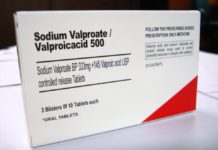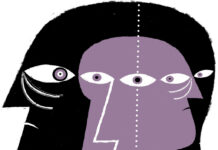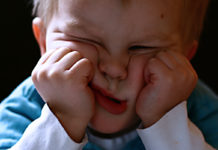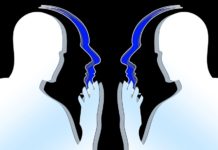Antidepressant-Induced Mania
It is generally recognized in antipsychiatry circles that antidepressant drugs induce manic or hypomanic episodes in some of the individuals who take them. Psychiatry's usual response to this is to assert that the individual must have had an underlying latent bipolar disorder that has "emerged" in response to the improvement in mood. The problem with such a notion is that it is fundamentally unverifiable.
Bipolar Diagnosis Linked to Childhood Adversity
With the ties between traumatic childhood experiences and mental health issues, should we continue to focus on biological approaches?
I Want Change
Only two hours after we got home, Dan fearlessly told me of the suicide plan that he'd devised while in the hospital. He had all that time to think about it while nobody was listening. He'd lost his dignity, his identity and his place in society. He had lost the will to live.
To Make Adolescence Permanent, Just Label it “Bipolar Disorder”
When parents accept the bipolar label, something seems to click in their minds, and it’s in this instant that their kid’s life is forever ruined. Now they retrospectively view all the turmoil that began in puberty as due to permanent brain illness rather than normal, outgrowable adolescent issues.
Childhood Bipolar Disorder, Deconstructed
Diagnosing children with juvenile or pediatric bipolar disorder is largely an American phenomenon. Do we actually have more “bipolar” children in the United States—or are we simply labeling more of them as such? If it is ever fair to call a child “manic,” isn’t the child’s environment the direction in which we should look?
Daughter of a Psychiatrist
Here I was, 15 years old and already in a long-term treatment facility. I was, on paper: crazy! This entire time, all the adults in my life had been speaking for me. I never felt like I was any of the things they said, but I went along with it. What else could I have done? Every time I rebelled, it only confirmed to my mother what she thought of me.
Study Explores Māori Community’s Multifaceted Understanding of “Psychosis”
A new study explores how “psychosis” and “schizophrenia” are viewed within the Māori community in New Zealand.
Valproate Linked to Decreased Brain Volume in Children Diagnosed with Bipolar Disorder
Researchers find that valproate decreases brain volume in a region associated with emotion processing across all participants.
Does DSM-5 Matter? Yes; but not for Psychiatrists
What makes the DSM so pernicious is that it is a cultural document whose influence transcends not only psychiatric practice but also the Western civilization from which it originates. Each revision of the DSM rescripts and reimagines how we make sense of our experiences, reinterprets what thoughts, feelings and behaviors are socially sanctioned, and ultimately what it means to be human.
Making the Case Against Antidepressants in Parliament
On Wednesday, May 11, there will be an inquiry by a work group in the U.K.’s Parliament into whether increases in the prescribing of antidepressants are fueling a marked increase in disability due to anxiety and depression in the U.K. I wrote about a similar rise in disability in the United States in Anatomy of an Epidemic, and the All Party Group for Prescribed Drug Dependence, which is the Parliamentary group that organized the debate, asked me to present the case against antidepressants.
Bright Light Therapy More Effective Than Medication Alone for Bipolar Depression
A new randomized, double-blind, placebo-controlled trial has found bright light therapy to be a powerful intervention that could provide an alternative to medication for people with “bipolar depression.”
Emotional Child Abuse Just as Harmful as Physical Abuse
Different types of child abuse have equivalent psychological effects, according to a study in JAMA Psychiatry. It has previously been assumed that emotional and verbal abuse could have different or less harmful impact on a child’s psychology than physical or sexual abuse, but research now suggests that these forms of abuse can be just as damaging.
The Mountain Man
Self-acceptance is a very human experience, and a necessary one in the pursuit of personal happiness. In my experience, the mental health field does an abysmal job of addressing this truth.
Can Children Have Bipolar Disorder?
After seeing the family for two sessions I came to the conclusion that what Adam was suffering from was inconsistent discipline, temper tantrums and misbehavior that were inadvertently encouraged by his parents. The correct prescription for Adam was not an antipsychotic medication that might cause him harm, but family therapy to help the parents implement a behavioral program that would fit Adam’s needs.
Searching for Zen and Finding a Cow
If I had a clinical problem, why was something as ancient and simple as meditation helping me? And if normal positive human habits could be so profoundly useful, why the heck was the field marketing pills and “clinical” coping mechanisms to me instead? This frustration helped me jump ship from the medical mindset and hop into the world of humanity.
Study Connects Environmental Risk Factors and Psychosis
A meta-analysis of known risk factors for psychosis finds elevated risk with the presence of childhood trauma, adverse life events, and affective dysfunction.
Minimal Evidence for Disruptive Mood Dysregulation Disorder in Childhood
Researchers offer a critical take on the inclusion of the Disruptive Mood Dysregulation Disorder in the DSM-V.
Study Explores Meanings of Bipolar Disorder to Those Diagnosed
The narratives about Bipolar Disorder promoted by drug companies may influence how those diagnosed understand themselves.
Could ‘Treatment Resistance’ be an Effect of Antidepressants?
Previously taking antidepressants could make individuals less likely to respond to treatment for bipolar II depression.
SSRI Antidepressants Increase Surgery Risks
There is accumulating evidence that taking SSRI antidepressants increases the risk of bleeding and other complications during surgery, according to a review published in the British Journal of Anaesthesia.
In Defense of Healthy Mania
It is important to distinguish, and not simply pathologize, experiences that are manic-like because they are time-honored states of mind associated with aspiration, ambition, and goal-achievement. The need to generate boundless energy, overtalk the issues to sustain single-minded focus and motivation, and have a somewhat grandiose vision of what can be accomplished, combined, can eventuate in a manic mix of tendencies necessary to bring higher-order goals to fruition.
Primary Care Practitioners May Mistake Irritability as Bipolar Disorder in Youth
Family medicine and pediatric providers are less confident in their assessment of irritability in youth than psychiatric providers, which may lead to overdiagnosis of bipolar disorder.
Childhood Adversity Influences Levels of Distress in Voice Hearers
Research finds that hearing negative voices explains how childhood adversity is related to distress.
2 Reasons Why Time-Outs Do Not Work
The fundamental importance of connection to a child helps us to understand the use of "Time-Outs" which, used improperly, can be like pouring gas on a fire in a situation that is already not working; causing a distressed child to go further awry and potentially contributing to symptomatology that puts them at risk of being identified as ADHD, anxious, or bipolar.
Study Suggests Mania More Common in Psychosis When Antidepressants Used
A prospective cohort study of those labeled high risk for psychosis finds a higher prevalence of antidepressant use among those who develop manic symptoms.




























